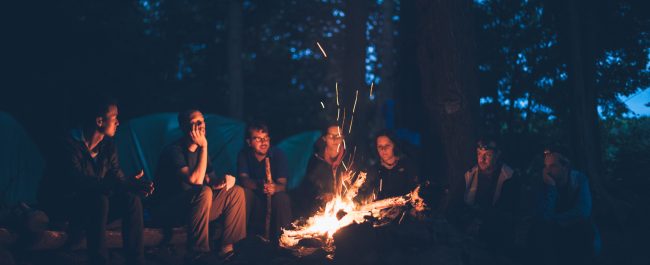Inside Story
The power of personal storytelling
‘Share your story’ is the message I’ve been repeatedly trumpeting across Fittie and beyond in various forms for the past six months. My role in the Safe Harbour Open Sea project is based around themes of ‘visitors and migration’ and has so far has involved gathering the stories, experiences and views of as many different people as possible to inform my creative projects.
After a fascinating and rewarding period of research, I am now surrounded by folders of audio recordings, collections of postcards, and reams of answers to online questionnaires, all forming tiny windows into other people’s lives and perspectives. But, although this process has been rewarding for me, I believe – and hope – it can also offer real benefits to the individual contributors and the community as a whole.
The role and benefit of storytelling was a strong and recurring feature in my studies on Reconciliation and Peacebuilding. In conflict situations where people have experienced injustice or trauma, often the simple act of telling your personal story, of letting the truth be heard, can be hugely cathartic for survivors. I was greatly moved by case studies from South Africa’s Truth Commission and ways that survivors’ testimonies have been used within numerous memorial projects in Chile, helping to restore victims’ silenced voices and with it, their agency and dignity. Although Fittie is by no means a war zone, I believe similar principles apply.
It may not be a war zone, but Fittie has experienced huge changes and a certain amount of destabilisation over the past few decades. Due to the rise of the oil industry and the resulting movement of people, this has fragmented and changed the character of the community which is now very different from the group of extended fishing families that it was in its earlier days. Although the community is still close-knit by modern urban standards, change, and attitudes towards change, definitely have an impact on both the longstanding residents and more recent residents.
Within this context, I feel it is important to give people the chance to reflect and honestly express their feelings and perspective. I think it’s important that people feel listened to and respected, and that their stories and views are valued. Many of the older contributors have said they found the experience of talking about their relatives, ancestors and memories very therapeutic. With generations passing away and some contributors’ childhood homes in the St Clement Street area now demolished, creating a lasting testament to these vanished lives honours and elevates their experiences, and simply communicates ‘this matters’.
However, I think this idea of recognising and valuing people’s stories applies to younger and more recent residents too. In a place where so much history and heritage is entwined with particular families, it can perhaps be hard to find your place and feel you belong. Recording the stories of more recent arrivals to Fittie and documenting their connection to the village also signifies that they matter and that they are now part of the community, with an important part to play in Fittie’s ongoing story.
As I now begin the arduous, but exciting, task of compiling the collected materials into various creative outcomes, I am surprised anew by the variety and richness of people’s stories. I feel like I’m weaving a huge, beautiful tapestry from very rich materials. When my work is complete, I hope it will form a diverse, colourful and meaningful representation of the changes, challenges and joys of living in this unique community.
By Victoria Fifield 2022
Victoria Fifield is originally from Glen Tanar, Aberdeenshire, and has a diverse creative background. Primarily a visual artist, Victoria also has skills and experience in design, music, creative writing and education. She has worked with Aberdeen Art Gallery, Big Noise Torry and several London based arts organisations including The Arts Factory and Apples and Snakes. With a passion for using the arts in grassroots community peace building, Victoria has also lived and worked in Israel and Palestine and is currently a trustee for the Bosnian youth arts charity Most Mira.
[Image Credit: Mike Erskine]

